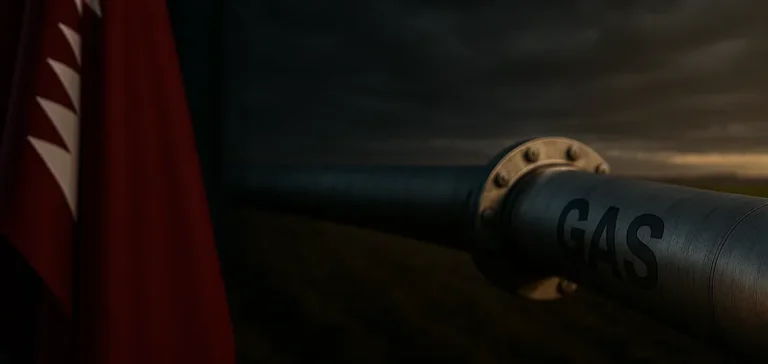Qatar has sent official letters to the European Commission and the Belgian government, threatening to cease its liquefied natural gas deliveries to Europe if the Corporate Sustainability Due Diligence Directive (CSDDD) is not modified. This diplomatic escalation comes as the European Union continues to seek diversification of its energy supplies following the drastic reduction in Russian gas imports.
The CSDDD, adopted in 2024, requires companies with annual revenues exceeding $519 million in the EU to meet strict sustainability and corporate behavior criteria. Penalties for non-compliance can reach up to 5% of the company’s total global revenue. More controversial for Qatar, the directive requires companies to adopt a climate transition plan aligned with the goal of limiting global warming to 1.5°C in accordance with the Paris Agreement.
Inflexible position on carbon neutrality
Qatari Energy Minister Saad al-Kaabi, also CEO of QatarEnergy, was categorical in his communication: “Neither the State of Qatar nor QatarEnergy have any plans to achieve net zero in the near future.” This statement contrasts sharply with European climate ambitions and underscores the growing gap between the EU’s decarbonization objectives and the interests of hydrocarbon-exporting countries.
Qatar, which holds the world’s highest per capita CO2 emissions at 42.6 metric tons per person in 2023, considers that the CSDDD infringes on the sovereign right of countries to define their own national contributions to the Paris Agreement goals. In an annex to its letter, Doha explicitly proposes removing the section of the directive concerning climate transition plans, deeming these requirements incompatible with its national energy strategy.
Critical stakes for European energy security
The Qatari threats come at a particularly sensitive time for Europe. In 2024, Qatar represented approximately 10% of the EU’s monthly LNG imports, positioning itself as the third supplier after the United States (46%) and Russia (16%). With the scheduled closure of the Ukrainian corridor at the end of 2024 and the European objective to completely eliminate Russian gas imports by 2027, the potential loss of Qatari supplies would create a significant deficit that would be difficult to fill quickly.
European alternatives remain limited. Algeria, which has three pipelines to the EU with two operating below capacity, could increase its exports but faces its own production constraints. The Trans-Saharan gas pipeline (TSGP) project linking Nigeria to Algeria, initially budgeted at $10 billion, now sees its cost estimated between $20 and $30 billion and remains blocked by major security and financial challenges.
Strategic reorientation toward Asian markets
Qatar has already begun redirecting its exports to Asia, where 25% of its LNG is now destined for China, followed by India (17%) and Pakistan (11%). This pivot reflects not only logistical advantages and reduced transportation costs, but also a less constraining regulatory environment. Asian buyers, traditionally bound by long-term contracts with Qatar, are now seeking more flexible conditions and competitive prices, creating favorable market dynamics for producers.
Paradoxically, while Qatar rejects European carbon neutrality goals, the country is investing in its own energy transition. The 800 MWp Al Kharsaah solar plant, inaugurated in 2022, and the goal of achieving 30% solar energy in the national mix by 2030 demonstrate a domestic diversification strategy. QatarEnergy is also building the world’s largest “blue” ammonia plant, with a capacity of 1.2 million tons annually by 2026, representing a $1 billion investment, positioning the country in the emerging low-carbon fuel market.
Tight schedule for European compliance
The implementation of the CSDDD follows a staggered schedule that will begin in 2027 for the largest European companies. EU companies with more than 5,000 employees and $1.74 billion in global revenue will have to comply by 2027, followed by those with more than 3,000 employees and $1.04 billion in revenue in 2028, then those exceeding 1,000 employees and $519 million in 2029. Non-European companies generating more than $519 million in revenue in the EU will also be subject to these obligations.
Facing pressure from Qatar and other trading partners, the European Commission proposed modifications in February 2025 aimed at simplifying certain requirements of the directive. These changes include postponing its implementation and reducing supply chain controls. Nevertheless, these adjustments have not satisfied Qatar, which maintains its position that the fundamental climate transition requirements remain unacceptable.
The recent trade agreement between the United States and the EU, providing for the purchase of $750 billion in American energy over three years, appears as an attempt to reduce European dependence on other suppliers. However, analysts emphasize the unrealistic nature of this objective, as the EU imported less than $80 billion in American energy in 2024. Achieving the $250 billion annual target would require tripling current imports, a considerable logistical and economic challenge in a context where projections indicate a global LNG oversupply of 6 to 13% by 2030.






















